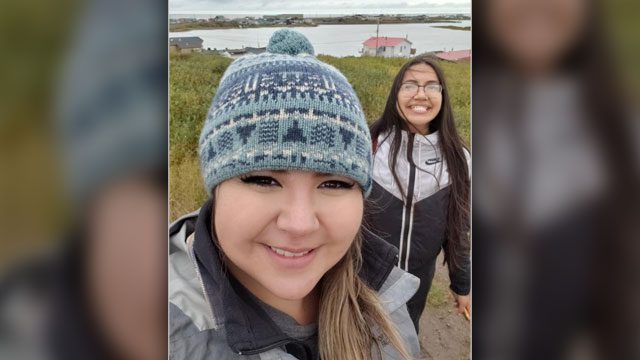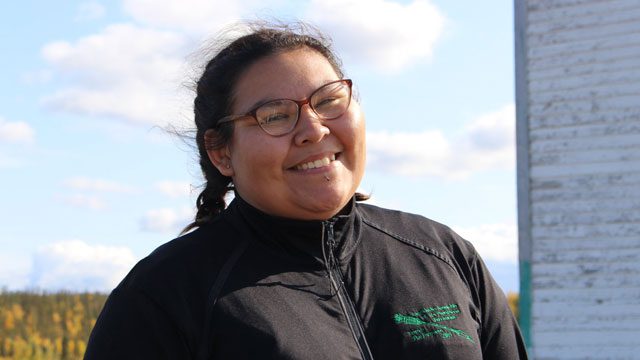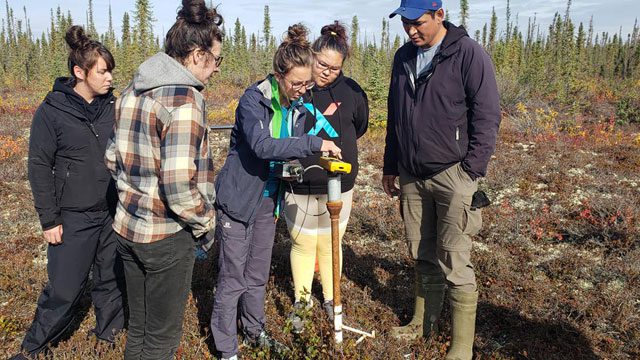Anonda Canadian looks up from her thick-framed glasses and gingerly states how she’s always been the youngest person by a long shot at on-the-land conferences.
But that’s not the case here. The 17-year-old is one of a dozen northern youth spending the week focusing on all-things climate change.
In August, APTN News tagged along to “The Young Leaders’ Summit on Northern Climate Change.”
For the last decade Ecology North, a not-for-profit based in Yellowknife, has brought together youth to share their experiences with climate change, discuss solutions with experts, and build upon their leadership skills.
This year the summit was hosted in the Beauford-Delta region of the Northwest Territories (NWT). It borders the Yukon to the west, Nunavut to the east and Arctic Ocean to the north.
The summit begins in Inuvik, the third-largest community in the territory, roughly 200 kms south of the Arctic Circle, on the traditional land of the Gwich’in Dene, Métis and Inuvialuit.
Gathered around a picnic table in the heart of Inuvik’s Chief Jim Koe Park, Anonda explained how her very being as an Indigenous person is under threat.

(Susan Machan (left) and Anonda Canadian. Ecology North)
“I feel like if I didn’t have that connection with the land I wouldn’t know who I am,” said the student from Ft. Providence, NWT. “Because it’s a big part of my culture and who I am.
“I don’t live on the land I live with the land.”
The rolling hills of berries and fireweed in the Delta, and the pingo-dotted landscapes leading up to the Arctic Ocean have sustained Indigenous peoples of the north since time immemorial.
But how long will these breathtaking views last?
Scientists have confirmed the Arctic is heating at twice the global average.
As sea ice and permafrost melt, it’s become an all-out war on vulnerable ecosystems.
“As a geologist we are taught that climate change happens naturally but that’s over millions of years,” said Susan Machan of Yellowknife.
“The rate it is going at, we are in an ice house right now, but going into a greenhouse which is not natural. A lot of it is to do with us. We are causing it and that is really freaky.”

(Myha Martin was part of this year’s climate-change summit. Ecology North)
Time is of the essence. In 2018, the territory set a goal of reducing greenhouse gas emissions by 30 per cent come 2030.
This came after heavy criticism and a review.
In 2017, Canada’s auditor general gave the territorial government a failing grade at every level how it was dealing with climate change.
The review said government departments of the Environment and Natural Resources and Infrastructure were reliant on patchwork approaches to dealing with climate change.
Now, all eyes are looking to the new federal and territorial governments for legislation and action to change the cost of living and energy security in northern communities.

(Measuring permafrost on the beautiful Beaufort Delta. Ecology North)
It’s something youth at the summit want to have a say in.
“I would like the government to take more responsibility,” said Mariah MacDonald. “Yes, Trudeau sort of did the single-use plastic ban to go into effect.
“But right after he signed off for a pipeline. It just feels like he is putting on this face.”
Participants of the summit immersed themselves in matters of melting permafrost, coastal erosion, food security, renewable energy solutions and adaptation through policy.
The students also worked through emotional conversations around the ecological grief each carried with them to focus on solutions.
It was no easy task to focus on the rapid transitions imposed on traditional lands, but this time around youth like Anonda would not be among peers her own age who want the same outcomes.









